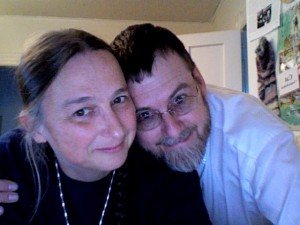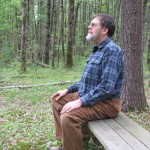 “What do you mean, Quaker Pagan? You can’t possibly be both!”
“What do you mean, Quaker Pagan? You can’t possibly be both!”
Every now and then, we do get a comment on the blog that, if politely worded, does drive at basically that point. Usually the critic is a Quaker and a Christian, though I have certainly heard similar points raised by Pagans.
Let me state a few things up front. Peter and I both do consider ourselves Pagan. Neither of us considers ourselves to be Christian–I never was one, and Peter hasn’t been for decades. And we do consider ourselves to be Quakers… as does our monthly meeting, which extended us membership after the normal clearness process.
We consider ourselves Quaker Pagans. (Why not Pagan Quakers? Pure aesthetics; we think the word order sounds better with Q before P.)
Here’s the argument for why Peter and I can’t possibly be both:
1. Paganism is a non-Christian religion.
2. Quakers are a Christian denomination.
3. ERGO…
Yes. We’ve considered that argument, oddly enough. It (and the peace testimony) kept us out of the Religious Society of Friends for years after we discovered that, unlike in our early twenties, the worship worked for us.
Here’s the thing. The premises that the argument above is built on are oversimplifications. Let me break it down into a little bit more detail in order to show what’s wrong with the argument as it’s given above.
1. Paganism is a family of religious traditions, including Wicca, Druidry, Celtic, Hellenic, and Khemetic reconstructionism, Asatru and various shamanic, animistic, and indigenous faiths which recognize the immanence of Spirit. It takes its inspiration from modern, post-modern, Romantic, Classical, and other strains of religious thought, philosophy and practice, and tends to favor experience over creed.
Most Pagans are polytheists; some are “hard polytheists” who see each deity named by humans as a distinct being, with little or no overlap with other deities. Thor is not Thunor, let alone Zeus being Jupiter or–shudder to think it it–Thor!
On the other hand, some Pagans are monists, believing, for instance, that “All the gods are one god; all the goddesses one goddess; and there is but one great initiator.” This is somewhat similar to the Hindu teaching about Brahma, for instance.
Then there are Pagans who are animists, who do not necessarily attend at all to gods or goddesses, but rather commune directly with the life of each plant, each stone, each bird or beast or wild place in the world.
Finally, there are Pagans who are non-theists and agnostics, whose juries may be out on whether or not gods or even spiritual beings exist, but who find it somehow “works” for them to act as though they did, in ritual or in meditation, or to whom the central truth of Paganism–that the here and now is sacred enough to be worthy of all the reverence and love we can show–is so compelling they need no supernatural elements of their faiths at all.
Two truths are the only core I am emphatically sure of in Pagan theology: the earth is sacred, and the feminine is as important and sacred as the masculine. Beyond that, there is great diversity of belief.
A non-Pagan, or a Pagan whose experience of all this diversity has been limited to one or two narrow segments of it, might be excused thinking that such diverse theology would never be able to mesh in a spiritual community. They would be wrong. This is because Paganism, as a family of religions, puts little stock in elaborate creeds and theological debates. Oh, we love to talk about our beliefs–but we do so from the perspective of our experiences. A Pagan is far more likely to be interested in creating rituals that work–that create powerful and transformative experiences for their participants–than in settling permanently rulings on “correct” belief.
From where I sit, that’s great. Because I’ve met no one thus far in this life, who has claimed to understand entirely the nature of God/the gods and everything, except for a few raving nutters.
Is a god we can completely understand, define, categorize, and pin down in human language really a god worth worshipping, I wonder?
So Pagans are impressed by what works. And one of the things we note, when we look at the natural world, works quite well, is diversity. An ecosystem with only one or two species is generally an unhealthy one. Diversity, not uniformity, is the hallmark of a healthy natural system.
Though it sometimes takes a good deal of tact and diplomacy to find ways of worshipping together that will be satisfying and meaningful for all of us, it is very, very common to find members of several Pagan religious traditions gathering together in spiritual community. We understand that an Asatruir will have a different sense of who the gods are and how we might best honor them than will a Wiccan or a shaman. But we can often find ways of collaborating and honoring our differences.
This means that, over the past twenty years, Peter and I have celebrated with worshippers of dozens of different gods, from dozens of different religious traditions. It works out, most of the time, provided we listen closely to each other and to our gods/spirits.
So, can a Christian be Pagan? Pagans can worship Thoth, Cernunnos, Hera, Hel, Amaterasu, Ogun, Aradia, Tiamat, or nothing at all. Worshipping Christ or his God? Well, I’ll admit, it’s a bit more controversial than worshipping Athena (though less so than worshipping Tiamat). This is because many Pagans are recovering Christians, on the lookout for ways that Christianity is trying to kidnap their communities and reconvert them to a religion that alienated them at some point in time… and because, well, Christianity, as practiced for the past 2000 years or so is an agressively imperialistic monotheism that denies other gods room to exist, save as deceiving demons.
Mind you, that’s a caricature. Lots of Christians do not have that kind of theology. But plenty do. So there’s a reason why Pagans get hives when somebody mentions Jesus. Yes, we’ve heard of him. More than once. More than enough for one lifetime, in many cases.
However, if Jesus were willing to quietly enter the circle, play nicely with the other deities, and not attempt to forcibly baptize those who were uninterested in joining his club, the majority of Pagans would probably be willing to shrug their shoulders, say to themselves, well, he’s not my deity, but whatever, dude, and get on with the business of building community.
There is nothing in Paganism that is immediately antithetical to Christianity, save that (some forms of) Christianity insists it is antithetical to Paganism.
So, to the extent that Quakers are Christian, there is nothing in Paganism that is antithetical to Quakers, either.
2. Which leads me to the next fallacy: that Quakers are a Christian denomination.
This one is going to get me into all kinds of trouble with other Quakers, many of whom believe that the Religious Society of Friends absolutely is and always was Christian. And, in fact, Quakers do have their origin (like many another Christian group) in an attempt to revive what its founders thought of as the early Christian church.
If a group’s boundaries are defined by its origins, then all Quakers areChristian.
However, many members of what is called the liberal branch of Quakers today do not identify themselves as Christians. In some monthly meetings (the small, local organizational unit of Quakers) non-Christians are the majority.
Still, the truth remains that in three out of four of the branches of modern American Quakers, all Quakers are indeed Christian; however in that fourth, liberal branch, many are not. They may self-identify as universalist Quakers (though universalists may also be Christian Quakers), as Jewish Quakers, as non-theist Quakers, or as a number of other kinds of Quakers, including Pagan Quakers… but not necessarily as Christians.
There is a good deal of controversy within the Religious Society of Friends–including in many liberal meetings–over this point. In many cases, Christian Quakers within the liberal branch of Quakers feel a bit beleaguered by the sometimes dismissive attitudes and statements made by non-Christian Friends within their meetings. I’d like to go on record as joining with them in that concern: though I’m obviously happy to be in a liberal meeting that has a universalist enough view of theology to allow me to be a member, it does not follow logically that I want my Christian sisters and brothers to be silenced.
As a Pagan, I have a sense that Whatever is out there fits but badly into human language for it. As a Pagan, I am used to a religious discourse that has many names and myths and metaphors in regular use, all attempting to reflect some small facet of the human experience of the sacred. I’m used to them not matching one another, as if ideas were a set of matching silverware.
And I know how hard it is to fit experiences of God into language at all.
I would be ashamed to deprive anyone of the language in which they can hear and understand deep truths about God. And I know from experience, as a Friend of some years now, that Quakers can and do hear the voice of Spirit couched in the words of the Bible. So, when a Friend has centered down deeply into Spirit, and been moved and stirred into vocal minstry that comes clothed in the words of Christian tradition, I try to open myself to what that message is trying to say: to me, to the gathered meeting, or to the world.
Prior to becoming a Quaker, the Bible was a dead book to me. In the years since then, I’ve watched as a verse here, a verse there, has bloomed into life for me, given vitality by the direct action of the Spirit moving through the Friend who spoke with its words of an immediate encounter with God.
Nothing, in my opinion, would justify my stopping the mouth of such a Friend. As someone who has given vocal ministry, I know how vulnerable it feels to let Spirit wash through you in that way. Even if the mythology and truths in which a Christian Friend’s ministry is rooted is alien to me, I want to support that Friend in their faithfulness to a Spirit which, somehow–and it is less strange to me, as a polytheistic Pagan, than to them, perhaps–speaks to us both.
I feel that it is my job, as the old Woolman story has it, to “listen where the words come from,” and not be frightened away by the sound of the syllables themselves, and whatever cultural baggage may come with them.
More than that, however: Quakers have evolved a practice and a set of traditions which are rooted in the language of that book. Though I can never accept a literalistic, fundamentalist interpretation of the Bible as the (and the only) Word of God, I have come to understand that the Bible is at least the Poetry of Friends. Since my conversion to the peace testimony and to Quakers, I have worked to learn the practices of deep listening and communal discernment Quakers rely on to find the way forward into peace. Those traditions and practices have been communicated in Christian language for over three centuries now, and whatever feelings I may have about imperialist Christianity, I am teaching myself to listen to what the poetry of the Bible is saying in the mouths of Friends about living in peace.
Is peace the central message of the Bible itself? Taken literally and as God’s biography, I can’t conceive how it could be interpreted in that manner. But that is not the Bible of which I speak; I am speaking only of the Bible that, as Christian Quakers might put it, has been read and understood “in the Spirit that gave it forth.”
The Spirit that gave it forth…
This is the final, hard core for me of the whole Quaker/Pagan/Christian/non-Christian nut. What is a Christian, anyway?
I have come to believe, based on my experiences in worship, that the Spirit which I encounter in Quaker meeting is the same Spirit which my Christian Friends encounter and name “Christ.” I don’t call it that; I’ve never been prompted to by Spirit. But I do attempt to live my life faithfully in accordance to its leadings.
So perhaps there is a way in which I could be termed a Christian after all. I don’t use that word, and I honestly don’t want to. (It’s one thing for a Christian Quaker friend to associate themselves with all that triumphalism and monotheistic hegemony; I’ve got a hearty distaste for that set of connotations for myself, however inaccurate they may be for the Spirit which I actually encounter in meeting on First Days.)
Of course, that explanation will not satisfy the evangelical Quakers out there. And perhaps my logic will leave a certain number of Pagans dissatisfied, too.
3. So the best place to end this little essay may be with something beyond logic.
After all, one of the great commonalities between Paganism and Quakers is that it is lived experience of Spirit that matters most:
I am a Pagan because, when I look up at a hillside at twilight, my womb warms with an answering fire. I feel Earth and the old gods in my belly and in my heart. I love them, and I have felt their love for me.
I am a Quaker because the Spirit of peace grabbed me by the scruff of the neck, picked me up, and plunked me down in the midst of Friends. And I’m a Quaker because the Spirit that spoke to James Nayler and to Quakers halfway around the world from me, and across the meeting room floor from me, speaks to me too.
I am a Quaker and I am a Pagan because that’s how the Spirit has led me. I’m just trying to keep up, dancing as fast as I can.



